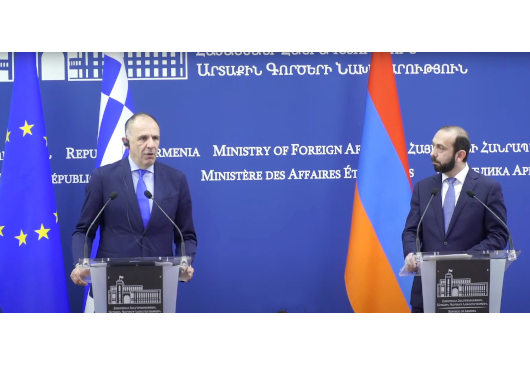 G. GERAPETRITIS: I would like to thank the Minister of Foreign Affairs of Armenia, Ararat Mirzoyan for his kind hospitality.
G. GERAPETRITIS: I would like to thank the Minister of Foreign Affairs of Armenia, Ararat Mirzoyan for his kind hospitality.
I am in Yerevan for the first time in my capacity as Foreign Minister of Greece to confirm the excellent level of our bilateral relations and our readiness to deepen our cooperation further.
Greece and Armenia are linked by traditional historical ties of friendship forged over centuries.
I am in regular communication with my friend, Ararat. We also met in September on the sidelines of the UN General Assembly in New York. More recently, in December, we met on the margins of the Foreign Affairs Council in Brussels, in which the Armenian FM was invited following my official request to EU H.R.
As regards the EU, Greece supports the deepening of relations with Yerevan and the increase of EU presence through the EU Mission in Armenia (EUMA). Greece will work to strengthen the EU-Armenia institutional dialogue, to offer our expertise, acquired over the years being one of the oldest EU Member States.
With Armenia, we cooperate closely and constructively within the framework of regional and international organisations. Greece supports Armenia's request for the protection of World Heritage Sites within the framework of UNESCO.
Greece is closely monitoring developments in the Caucasus region. From the very first moment, we have expressed our solidarity with the people of Armenia and sent humanitarian aid for the needs that have arisen from the mass, violent, exodus of the population from Nagorno Karabakh.
Greece pursues its foreign policy on the basis of the principles of international law, respect for sovereignty, and territorial integrity. Greece, as a proponent of the peaceful settlement of disputes, is firmly opposed to the use of force and instead advocates for dialogue and consultation.
To this end, we welcomed the Joint Statement issued by Armenia and Azerbaijan, which announced the mutual release of prisoners and confidence-building measures between the two parties.
We support the resumption of talks between Yerevan and Baku towards consolidating security and stability in the South Caucasus region. The guiding principle for both sides must be the achievement of a lasting, just, and sustainable regional peace and good neighborly relations. This is also the direction taken by Armenia's “Crossroads of Peace” connectivity project, which we consider feasible and inclusive.
From this podium, I would like to emphasize once again the importance that Greece attaches to addressing the humanitarian needs of the displaced population. We look forward to increasing bilateral cooperation in all sectors and to strengthening our relations.
I thank you very much Minister Mirzoyan for your hospitality and warm welcome here in Yerevan.
JOURNALIST: Minister Gerapetritis, coming from another complicated region, do you really think peace is possible between Baku and Yerevan in the near future?
G. GERAPETRITIS: This is a question that cannot be answered within a few minutes, as you can imagine. We believe in dialogue. In Greece, we keep saying that there are three words of Greek origin that could be the solution for any sort of international dispute and aggression, namely democracy, diplomacy, and dialogue. So, we clearly think that the parties involved should be in a constant dialogue.
I think the “crossroads of peace” presented by the Armenian government is a feasible, sustainable, and fair solution to the problem. We believe that a peace process should address specific issues concerning the boundary delimitation and be as detailed as possible to prevent the eruption of future hostilities. I think that both parties should continue being engaged in this process. I believe that there is a serious, realistic chance that we will have a solution in the future. Greece will provide good offices for this not only in international fora but also in the relationship with Azerbaijan and Türkiye. Overall, I think that the Armenian government supports prosperity and everlasting peace in the region and is trying its best to find a solution that would be not only to the benefit of the Armenian people but also a realistic solution for an everlasting peace.
January 10, 2024


